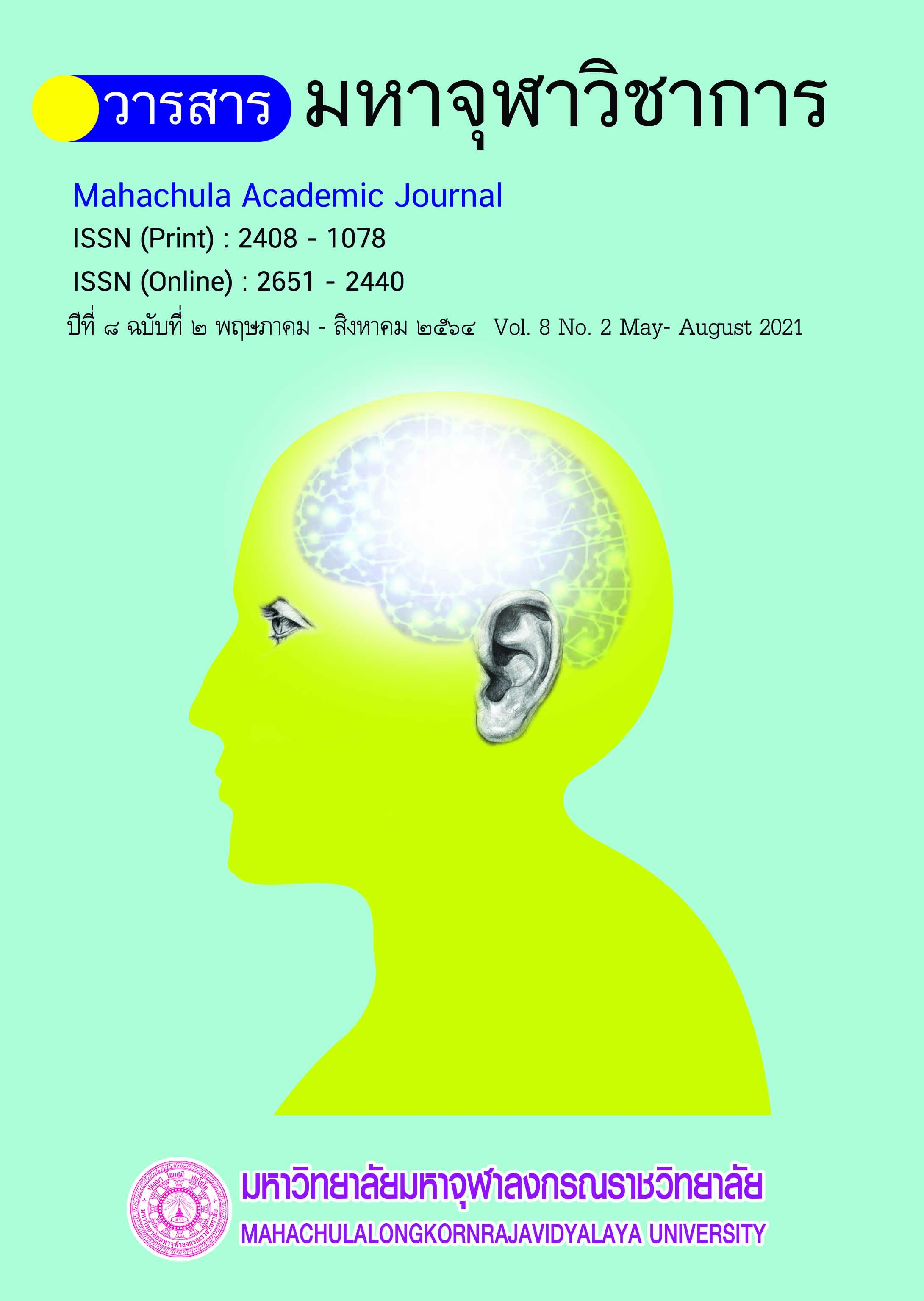Buddhist Principles According to Psychology for Sustainable Development
Main Article Content
Abstract
The principles of Buddhism in accordance with the psychology for sustainable development must be practiced by the Threefold Principles. to further train the body, speech, mind and wisdom until reaching the ultimate goal, which is Nirvana according to the concept of Buddhism Self development is learning and practice. in order to fit balance of life There is a harmonious relationship between the person's lifestyle and the environment. and focus on making yourself happy self-aware Self-understanding rather than material dependence Therefore, it is a guideline for sustainable life development. By developing oneself according to the Buddhist Dharma in 3 ways: (1) Tama means knowing and restraining one's mind. self improvement training by doing good deeds (2) Sikkha is education for enlightenment. know the benefits See everything as a learning to improve and develop yourself (3) Bhavana is the practice of vipassana meditation according to the four foundations of mindfulness, which is the use of mindfulness and wisdom to determine the realization of form-name, physical condition, feeling, mind and dharma according to reality. and behaviorism psychology that is the principle of behavior change in self development or improvement born of learning is the result of human interaction with the environment. And the behavior of the person expressed can be changed. Due to the karma that occurs in that environment, there are two types of karma: (1) Karma that is a positive reinforcement (2) Negative reinforcement can help a person to remove unsatisfactory environmental stimuli.
Article Details
References
ทา ปิณฑะแพทย์. พฤติกรรมมนุษย์และการพัฒนาตน. กรุงเทพมหานคร : ภาควิชา จิตวิทยาและการแนะแนว. สถาบันราชภัฏสวนสุนันทา, ๒๕๔๒.
พระธรรมธีรราชมหามุนี (โชดก ญาณสิทธิ ป.ธ. ๙). เพชรในดวงใจ. พิมพ์ครั้งที่ ๗. กรุงเทพมหานคร : โรงพิมพ์พิทักษ์อักษร, ๒๕๓๙.
พระไพศาล วิสาโล. สุขแท้ด้วยปัญญา วิถีสู่สุขภาวะทางปัญญา. พิมพ์ครั้งที่ ๓. กรุงเทพมหานคร : สํานักงานกองทุนสนับสนุนการสร้างเสริมสุขภาพ สสส, ๒๕๕๒.
พระมหาโพธิวงศาจารย์ (ทองดี สุรเตโช ป.ธ. ๙, ราชบัณฑิต). พจนานุกรมเพื่อการศึกษาพุทธศาสน์. พิมพ์ครั้งที่ ๕. กรุงเทพมหานคร : ธรรมสภาและสถาบันบันลือธรรม, ๒๕๕๗.
ไพศาล ไกรสิทธิ์. การพัฒนาตน. ราชบุรี : สถาบันราชภัฏหมู่บ้านจอมบึง, ๒๕๕๒.
มหาจุฬาลงกรณราชวิทยาลัย. พระไตรปิฎกภาษาไทย ฉบับมหาจุฬาลงกรณราชวิทยาลัย. กรุงเทพมหานคร : โรงพิมพ์มหาจุฬาลงกรณราชวิทยาลัย, ๒๕๓๙.
ราตรี พัฒนรังสรรค์. พฤติกรรมมนุษย์กับการพัฒนาตน. กรุงเทพมหานคร : สถาบันราชภัฏจันทร์เกษม, ๒๕๕๔.
วิไลวรรณ ศรีสงคราม. จิตวิทยาทั่วไป. กรุงเทพมหานคร : ทริปเปิ้ลกรุ๊ป, ๒๕๔๙.
สมเด็จพระพุทธโฆษาจารย์ (ป.อ. ปยุตฺโต). พจนานุกรมพุทธศาสตร์ ฉบับประมวลธรรม. พิมพ์ครั้งที่ ๓๑. กรุงเทพมหานคร : ผลิธัมม์, ๒๕๕๘.
สมเด็จพระพุทธโฆษาจารย์ (ป.อ. ปยุตฺโต). พจนานุกรมพุทธศาสตร์ ฉบับประมวลธรรม. พิมพ์ครั้งที่ ๑๖๗. กรุงเทพมหานคร : โรงพิมพ์มหาจุฬาลงกรณราชวิทยาลัย, ๒๕๖๑.
สมเด็จพระพุทธโฆษาจารย์ (ป.อ. ปยุตฺโต). การพัฒนาที่ยั่งยืน. พิมพ์ครั้งที่ ๒๑. กรุงเทพมหานคร : มูลนิธิโกมลคีมทอง, ๒๕๖๑.
สมเด็จพระพุทธโฆษาจารย์ (ป.อ. ปยุตฺโต). สุขภาวะองค์รวมแนวพุทธ. พิมพ์ครั้งที่ ๑๒. กรุงเทพมหานคร : อักษรสัมพันธ์ ๑๙๘๗ จํากัด, ๒๕๔๙.
สมโภชน์ เอี่ยมสุภาษิต. ทฤษฎีและเทคนิคการปรับพฤติกรรม. กรุงเทพมหานคร : สำนักพิมพ์จุฬาลงกรณ์มหาวิทยาลัย, ๒๕๕๖.
สงวน สุทธิเลิศอรุณ. พฤติกรรมมนุษย์กับการพัฒนาคน. กรุงเทพมหานคร : ทิพยวิสทุธิ์, ๒๕๕๓.
อโณทัย อาตมา. รู้นิพพานประสาชาวบ้าน. กรุงเทพมหานคร : สุขภาพใจ, ๒๕๔๔.
Gavol D Ryff and Gorey LM Keyes. Stvuctue of Psychogicat Well-bery primavg factovs. 1995.


